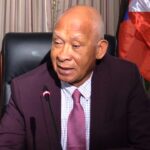Richard Madeley clashed with the President of Guyana live on air this morning over the South American leader’s demands for the UK to pay slavery reparations in the wake of UN reports calling on countries to consider compensation.
President Irfaan Ali, whose country received a formal apology last month from the family of 19th century Prime Minister William Gladstone for their historical connection to slavery, said that the UK must realise it ‘still benefits from the greatest indignity to the human being’.
Gladstone’s father John owned or had control over more than 2,500 slaves on his sugar plantations in Guyana and Jamaica. Early in his career as an MP, William Gladstone spoke out in defence of his father’s activities and also in opposition to the abolition of slavery.
Mr Ali’s comments come after a report by UN chief Antonio Guterres called on countries to consider financial reparations for the ‘harms suffered as a result of colonialism and enslavement’.
Last month, a leading international judge also claimed Britain owed almost £19trillion in reparations for its role in the international slave trade, and even that might be an ‘underestimation’.
Madeley was visibly furious with Mr Ali’s demands and at one point slammed the table in anger, accusing the President of Guyana of asking not just for money but also ‘gestures’, suggesting that perhaps he wanted the Royal Family to ‘hand over a palace to your country’. Mr Ali said he simply wanted ‘justice’.
When Madeley asked Mr Ali why today’s generation should ‘carry the burden’ for what their ancestors did, the president – who will be addressing world leaders on the topic at the UN General Assembly in New York later today – told Good Morning Britain: ‘Oh, it’s not a burden at all.
‘You are one of the beneficiaries of that slave trade, so this is not a burden.
‘You should be concerned and you should pay because you today still benefit from the greatest indignity to the human being, and that is the slave trade.
‘And not only did you benefit during the slave trade, and your country develop, but look at what it cost the developing world.
‘During slavery, resources were used to build your country, build up your capacity. You were able to then become competitive, able to invest in mechanisation and developing countries like ours were left behind. So you should be very concerned, because you are prime beneficiaries of exploits of slavery.’
Madeley had questioned the president on why ‘someone who maybe had an ancestor seven or eight generations ago should have to pay for what an ancient ancestor did’.
He also asked: ‘How far back do we have to go on this? We are speaking exclusively on Western imperialistic slavery to summarise, but almost every civilisation on the planet owes its existence and prosperity almost always to crimes, in the past.
‘Why just target one particular era in history? Some would argue that’s the argument of political convenience. Its a handy handle to hang your argument on.’
But a defiant Mr Ali – speaking from New York – replied: ‘I think you’re doing a great injustice to compare slavery with any other historical facts that you are mentioning.
‘It is a great injustice to the indignity that slavery brought to people.’
Madeley then appeared to get more wound up as the topic of the Royal Family came up.
‘One of the points you’ve been making today is about our Royal Family,’ he said.
‘And you feel that it’s not just about the finances involved here in terms of reparations for slavery.
As he thumped the table in frustration, Madeley continued: ‘It’s about the gestures.
‘And you think that the British Royal Family should make a big gesture, don’t you? What do you mean? Hand over a palace to your country?’
‘Well no, we don’t want the British to hand over a palace that we built,’ the president replied.
He continued: ‘If you go to many of the palaces in Britain, you’ll see the lovely hard work from Guyana. You will see the sweat, tears and blood of the slaves who were exploited, and the revenue that was earnt from the exploitation. So we’re not asking for a palace; we’re asking for justice.’
It was recently reported that Caribbean nations will make formal demands for the Royal Family to make slavery reparations by the end of the year.
Rather than trying to negotiate inter-governmental agreements, several nations want to put their case directly to descendants of those thought to have benefited from slavery, including King Charles.
Mr Ali added that when he came on to the programme, other topics such as net zero and climate injustice were being spoken about – something he believes is at the forefront of discussion.
He continued: ‘This is the problem. We live in a very unjust society. We condemn completely the war in Ukraine. But if you look at the mobilisation of resources in the war in Ukraine in two years, you have mobilised more support for Ukraine than you have mobilised for Haiti for 60 years.
‘You have mobilised more support for Ukraine than you have mobilised for Palestine in 20 years. You have mobilised more support for Ukraine in just one and a half years than you have mobilised to address hunger in Africa for three years.
‘That is the type of unjust way we have been dealing with these crises. We are not going to tolerate the injustice that occurred during slavery to be compared with any other system. Slavery, we all agree, was the greatest injustice ever done to human beings.’
Yesterday’s UN report on slavery has been hailed by campaigners as an important step forward in the fight for reparative justice.
The report said: ‘Under international human rights law, compensation for any economically assessable damage, as appropriate and proportional to the gravity of the violation and the circumstances of each case, may also constitute a form of reparations.
‘In the context of historical wrongs and harms suffered as a result of colonialism and enslavement, the assessment of the economic damage can be extremely difficult owing to the length of time passed and the difficulty of identifying the perpetrators and victims.’
It stressed that the challenge in making a legal claim for reparation ‘cannot be the basis for nullifying the existence of underlying legal obligations’.
Reacting to the report, Labour MP Bell Ribeiro-Addy, who chairs the all-party parliamentary group on Afrikan Reparations, told The Guardian: ‘This is a hugely significant step for the international reparations movement. For decades, grassroots organisations have fought for this level of recognition for their claim.
‘Those who were enslaved were not in a position to push for reparations, but their descendants who continue to suffer the impact of African chattel slavery are.’
Last month, Guyana received an apology from the descendants of Scottish 19th-century sugar and coffee plantation owner John Gladstone, the future PM’s father.
The former PM’s father owned or held mortgages over 2,508 enslaved Africans who worked on his sugar plantations in Guyana and Jamaica.
When slavery in the colonies was abolished in 1833, he received £105,781 in compensation.
He was given £90,729 for the 1,702 in Guyana but just £15,052 for 806 Jamaicans.










